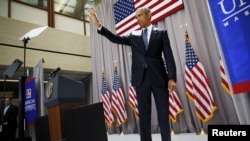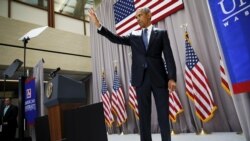In September, the U.S. Congress will vote on whether or not to disapprove the comprehensive nuclear accord agreed to last month by the P5+1 countries and Iran. In a speech in Washington defending the deal, President Barack Obama was blunt:
“The choice we face is ultimately between diplomacy or some form of war. Maybe not tomorrow, maybe not three months from now, but soon.”
Mr. Obama added that, ironically, “Military action would be far less effective than this deal in preventing Iran from obtaining a nuclear weapon.”
“Every estimate, including those from Israeli analysts, suggests military action would only set back Iran’s program by a few years at best, which is a fraction of the limitations imposed by this deal.”
Mr. Obama called the Joint Comprehensive Plan of Action, or JCPOA, “the strongest nonproliferation agreement ever negotiated,” permanently prohibiting Iran from obtaining a nuclear weapon by verifiably cutting off all Iran’s pathways to a bomb, thereby securing one of the U.S.’s critical security objectives by means of “hard, painstaking diplomacy.”
President Obama noted that all problems with Iran are not solved by the nuclear accord:
“The ruling regime is dangerous and it is repressive. We will continue to have sanctions in place on Iran’s support for terrorism and violation of human rights. We will continue to insist upon the release of American’s detained unjustly.”
Mr. Obama decried the rhetoric and behavior emanating from some parts of Iran, calling it “offensive and incendiary.” But he said that “superpowers should not act impulsively in response to taunts or even provocations that can be addressed short of war. Just because Iranian hardliners chant “Death to America,” he said, “does not mean that’s what all Iranians believe:”
“The majority of the Iranian people have powerful incentives to urge their government to move in a different, less provocative direction, incentives that are strengthened by this deal. We should offer them that chance. We should give them that opportunity.”
“It’s not guaranteed to succeed,” said President Obama. “But if they take it, that would be good for Iran. It would be good for the United States. It would be good for a region that has known too much conflict. It would be good for the world.”

















